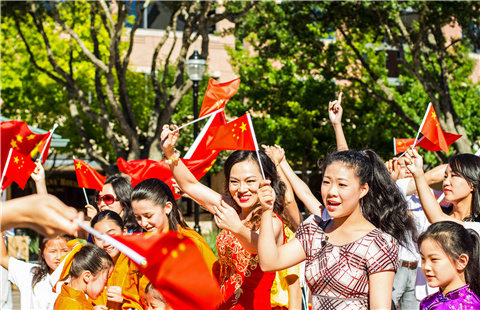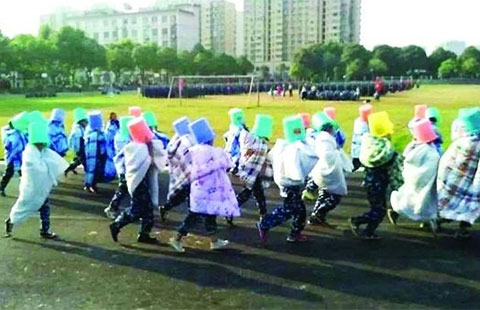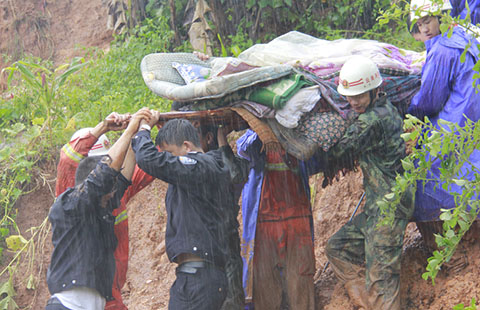Fewer visas for Mecca doesn't affect Chinese
Updated: 2015-09-19 09:49
By CUI JIA(China Daily)
|
||||||||
Although the Saudi Arabian government has issued 20 percent fewer visas to foreign Muslims to attend the annual hajj pilgrimage to Mecca this year, the number of Chinese pilgrims allowed into the holiest city of Islam remains unchanged, the vice-president of the China Islamic Association said.
"Currently, all 14,500 Chinese pilgrims from 27 provinces and regions are in Mecca preparing for the annual hajj," said Yang Zhibo, vice-president of the association, in Beijing.
Yang, who is in charge of organizing this year's pilgrimage, said Saudi Arabia's decision to issue fewer pilgrimage visas is because authorities want to control the number of people entering Mecca's Grand Mosque. A huge project is underway to expand the area surrounding the Kaaba, the cube-shaped structure at the center of the mosque that plays a major role in the hajj.
Three Chinese Muslims were among those injured on Sept 11 when a massive crane on the construction site toppled onto the Grand Mosque due to strong winds, killing at least 107 people. "It won't affect the hajj pilgrimage, but we have asked Chinese Muslims to take extra precautions," he said.
Escalating terrorist activities in Syria and Iraq have also caused Saudi Arabia to be more careful when issuing visas, to prevent the penetration of religious extremism during the annual pilgrimage, which could attract more than 3 million Muslims from around the world, Yang said.
He added that he is glad the number of the Chinese pilgrims wasn't cut, because there has always been a long waiting list to attend the annual pilgrimage organized by the Chinese government in Muslim-populated areas such as the Xinjiang Uygur autonomous region, home to half of China's Muslim population.
"As people's lives are getting better in recent years, more people can afford to go on the pilgrimage. So the number of applicants has soared, causing the waiting time to become even longer," he said.
To take part in the pilgrimage-a religious duty for Muslims-Chinese Muslims must register at the website of their local religious affairs bureau. The annual quota given to each province or region depends on its Muslim population.
In January, 32 officials from Xinjiang were investigated and punished for taking bribes to arrange for pilgrimage applicants to move ahead on the waiting list. Yang said the case has had a big impact on Muslim communities around China.
"Starting this year, we have required local religious affairs bureaus to publish the full list of those who made the pilgrimage delegation and those who cannot go, as well as the reason why, so the process can be more fair and transparent," he said.
"In the past, we normally reserve some places in the delegation for backup. To prevent the chances for corruption, those reserved places have all been removed from the system and given to applicants this year."
The Chinese pilgrimage delegation has prepared an emergency evacuation plan in case of outbreaks of Ebola or Middle East Respiratory Syndrome. More than 70 medical workers are accompanying the delegation to Saudi Arabia.
- UN chief: Those blocking fleeing refugees should 'stand in their shoes'
- Hungarian riot police detain migrants
- IOC announces five cities bid for 2024 summer Olympic
- Japan opposition to halt vote on security bills
- Japan protesters rally as security bills near passage
- Australia launches first air strikes against IS

 Across America over the week (Sept 12-18)
Across America over the week (Sept 12-18)
 House showcasing Sino-American friendship open
House showcasing Sino-American friendship open
 Top 10 M&A deals between China and US in 2015
Top 10 M&A deals between China and US in 2015
 Messy dorm earns grueling punishinment for students
Messy dorm earns grueling punishinment for students
 Seven killed in landslide in SW China
Seven killed in landslide in SW China
 Chinese forces arrive in Malaysia for military exercise
Chinese forces arrive in Malaysia for military exercise
 Top 10 M&A deals between China and US in 2015
Top 10 M&A deals between China and US in 2015
 Delicious bites in record-breaking sizes
Delicious bites in record-breaking sizes
Most Viewed
Editor's Picks

|

|

|

|

|

|
Today's Top News
President stresses Sino-US harmony
LA-Las Vegas link gets help
US CEOs give nod to BIT
Economy worries prompt Fed to hold rates steady
Google demos online marketing strategies to support Chinese SMEs
The ancient city takes a new route along the Silk Road
Villagers angry at verdict on fatal fire
Promoting the landscapes of China
US Weekly

|

|








